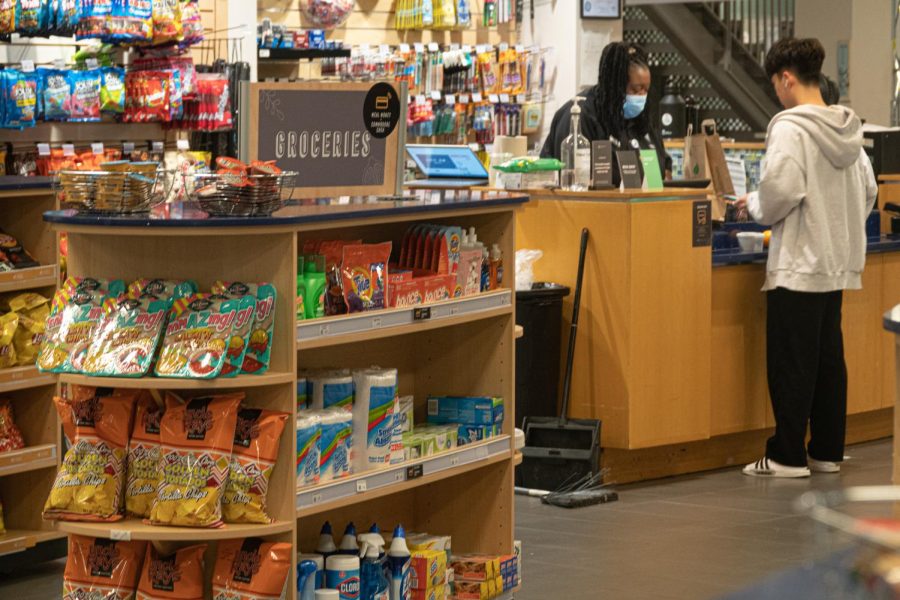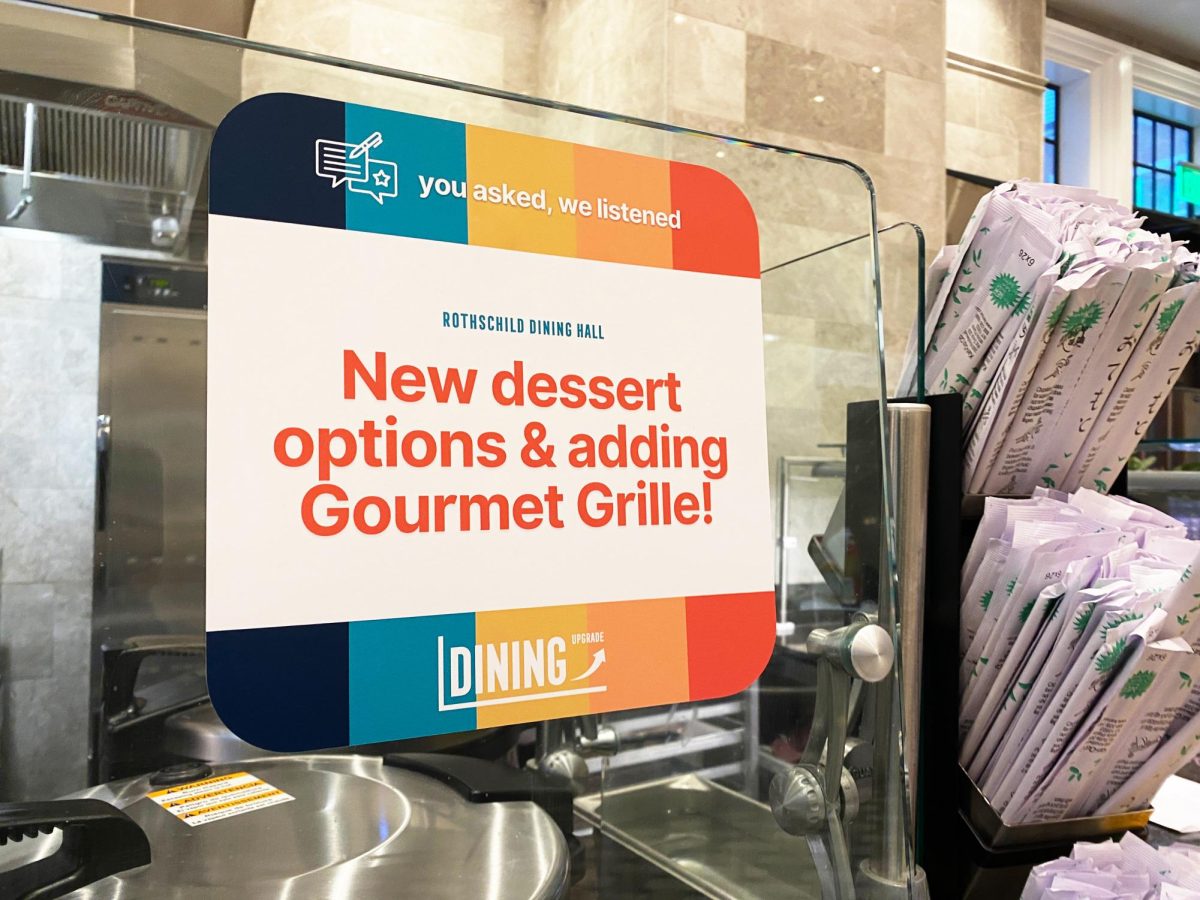Editor’s note: This piece contains a brief mention of eating disorders and may be triggering for some readers.
It’s 12:10 p.m. at Rand. The smell of freshly baked cookies fills the air, lines zig zag every which way, winding around corners, out doors and down hallways, people are screaming through their masks struggling to communicate above the bustle. There’s a girl in a booth by herself crying into her 2301 bowl. Everyone looks tired and sweaty after rushing to the dining hall, hoping to be able to get a meal in under an hour.
Staffing shortages make organizing campus dining difficult—and understandably so. However, when staffing and food shortages are so severe that Vanderbilt is distributing $50 a day to all students on a meal plan, why are upperclassmen required to purchase more meals? Why should we pay for more meal swipes while Munchie Marts are simultaneously limiting what a swipe can purchase? Students would appreciate and benefit from more autonomy in campus dining plans. And, in our current pandemic state, so would dining staff.
Historically, juniors and seniors living on campus were required to purchase 14 and eight swipe meal plans, respectively, with the option to increase those numbers if they so wished. Today, however, juniors and seniors living on campus are required to purchase 19 and 14 meals respectively, increasing both the cost and quantity of their required purchases. This increase in costs not only puts more financial stress on students, but also puts more stress on the already understaffed dining halls to provide more meals for more students.
In a survey sent to class GroupMe chats, out of 244 anonymous Vanderbilt students (59 first-years, 52 sophomores, 72 juniors and 41 seniors) 214 students reported being on a Vanderbilt meal plan. Nearly 49 percent of those students said that they “feel financial stress from having to purchase the required meal plan for [their] year.” Several students opted to leave optional commentary at the end of the survey reporting that they had saved significant amounts of money living off-campus in the past and purchasing their own groceries. The financial stress students feel from required meal plans might be partially alleviated if students had the freedom to choose a smaller meal plan and grocery shop.
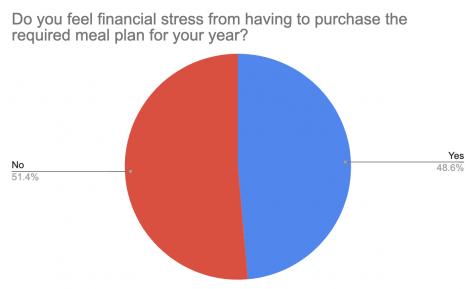
Many students living on campus in the Village at Vanderbilt Townhomes and Apartments and the Morgan and Lewis residence halls have full kitchens, including stovetops, ovens, refrigerators and sinks. The increased meal plans discourage students with full kitchens from using these spaces. It’s not realistic for students to spend even more money on groceries when they’re already spending so much on meal swipes.
Of the students who reported having a full kitchen, only 10.6 percent reported using their kitchen regularly or at least once per day. However, 76.8 percent of students with full kitchens reported that they would use their kitchens more often if they were on smaller meal plans. Students with kitchens should be able to use them, and in order to do so, should be able to opt-out of such an intensive meal plan so that they can spend their money at the grocery store.
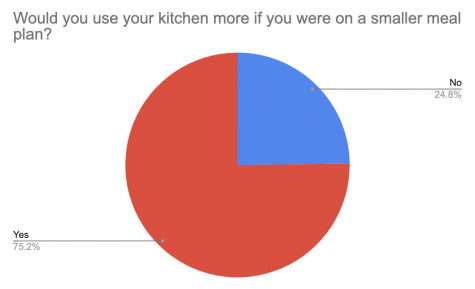
For 13 weeks of school, if a student purchases the smallest possible required meal plan for seniors, the 14 plan, and uses each and every one of those swipes, each meal swipe comes out to cost approximately $13. While this is reasonable for students who don’t have kitchens and who will eat every meal on the meal plan, many students who have kitchens don’t use all of their meal swipes, effectively wasting $13 each time they don’t swipe. Groceries can cost much less than $13 per meal, and many students with full kitchens would take advantage of this if the option were available to buy groceries instead of using meal swipes at dining halls. Even students without kitchens occasionally miss meal swipes because they’re exploring Nashville and eating at local restaurants.
While campus dining does an excellent job of trying to provide food for all students with dietary restrictions and from a variety of cultures, some students miss their dad’s meatloaf or their mom’s curry or just prefer to eat a certain way. Using kitchens to share culture, remind ourselves of home or to make food suitable to a particular diet is much easier if students don’t feel obligated to use the meal swipes which they’ve already been forced to purchase.
Students have also lost autonomy in Munchie Marts. In previous years, almost every food item found in Munchie Marts counted as an entree or a side, giving meal swipes used at Munchie Marts a good value. However, now meal swipes only include specific entrees and sides, leaving snacks and staple grocery items such as bread only available for purchase with Meal Money or Commodore Cash. There are some grocery-like items like rice, beans, pasta, eggs and frozen fruit available for meal swipes in the form of “market baskets,” these items are limited and don’t include fresh vegetables, sauces, bread or spices to cook the dry items with. Further, the market basket items are all very inexpensive at typical grocery stores, so spending a $13 meal swipe on five servings of dry pasta can seem almost ridiculous when five whole boxes of pasta can cost $5 at Kroger.
While the options available for meal swipe purchase are mostly allergen and dietary restriction friendly, the choice that used to be available in Munchie Marts is no longer present. In the survey, 74.5 percent of students on a meal plan reported being unsatisfied with what a meal swipe can purchase in a Munchie Mart. Students want more options, and if they had the freedom to use their money as they so choose, they’d likely be much more satisfied with their meal plans.
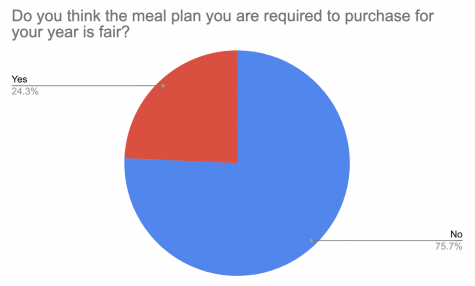
Currently, dining halls at Vanderbilt are overworked. They’re understaffed and running out of food, even with limited operating hours. This is impacting students harshly, as demonstrated by the open-ended section of the survey where students could describe what they’d experienced in campus dining. Many students described being unable to use meal swipes because dining halls opened too late in the morning or because they were closed so early at night that their classes and labs ran later than the dining halls were open. One student said, “I can understand the dining hall hours being limited due to staffing shortages, but if that’s the case, we should then be able to turn to Munchie Marts to get the food we need with the meal swipes we pay for.”
Some students recounted being unable to access foods that were safe for their dietary restrictions because lines were so long that they didn’t have enough time to get food they could eat between classes. Multiple students reported that the chaos and lines in dining halls made them unwilling to seek out food, and symptoms of past eating disorders are resurfacing.
One student, who was previously diagnosed with an eating disorder, wrote that, “long wait times everywhere (Suzies and [Taste of Nashville] spots too) and restrictions put on Munchie Mart items really contribute to my not eating anything for 72+ hours straight.”
This is unacceptable and could be mitigated by adding more choices in dining plans. If students who wished to be on smaller meal plans were on smaller meal plans, then the lines at dining halls would be more manageable.
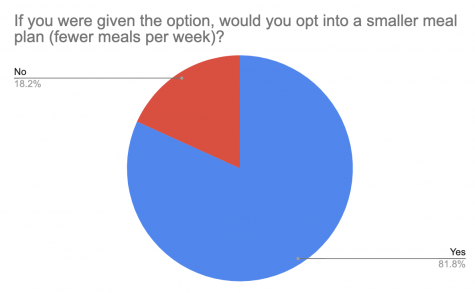
Increased student autonomy in meal plan choice is something students want. Of the students on meal plans, 81.8 percent said they would opt in to a smaller meal plan if given the option. Vanderbilt, it’s not too late to grant these students the autonomy they deserve while simultaneously relieving some of the stress from your overworked and understaffed dining halls. Let us decide what meal plan is right for our budgets and diets.






